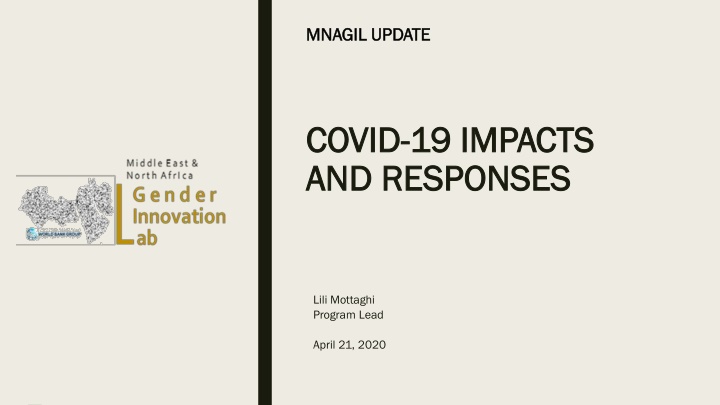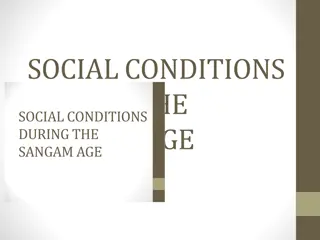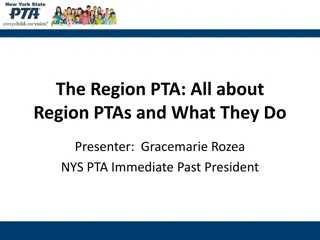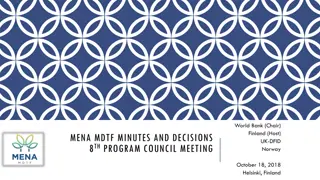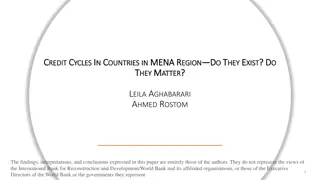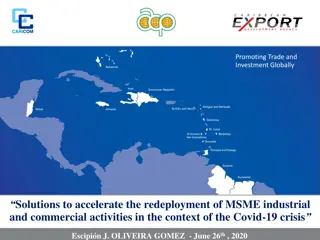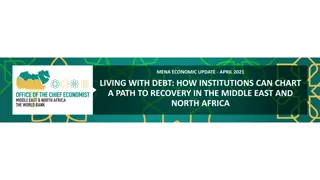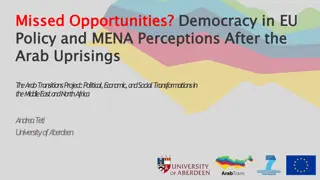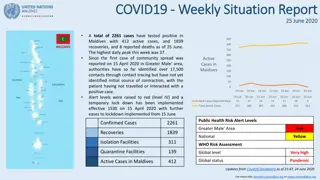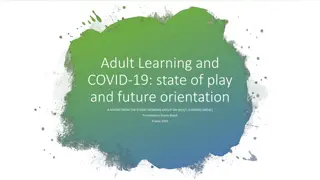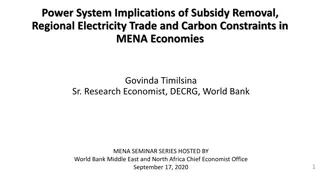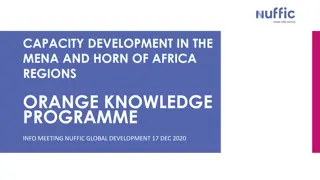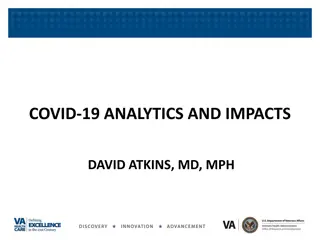COVID-19 Impacts and Responses in MENA Region
Economic, social, and gendered impacts of the COVID-19 crisis in the MENA region are highlighted, including the challenges faced by women. Responses by WBG MENA to mitigate the crisis and support vulnerable groups are also outlined.
Download Presentation

Please find below an Image/Link to download the presentation.
The content on the website is provided AS IS for your information and personal use only. It may not be sold, licensed, or shared on other websites without obtaining consent from the author.If you encounter any issues during the download, it is possible that the publisher has removed the file from their server.
You are allowed to download the files provided on this website for personal or commercial use, subject to the condition that they are used lawfully. All files are the property of their respective owners.
The content on the website is provided AS IS for your information and personal use only. It may not be sold, licensed, or shared on other websites without obtaining consent from the author.
E N D
Presentation Transcript
MNAGIL UPDATE MNAGIL UPDATE COVID COVID- -19 IMPACTS 19 IMPACTS AND RESPONSES AND RESPONSES Lili Mottaghi Program Lead April 21, 2020
Roadmap Economic, social, and gendered impacts of the COVID-19 crisis in MENA WBG MENA new platform to respond to the COVID-19 crisis MNAGIL current projects and responses to the COVID-19 crisis MNAGIL new COVID-19 activity and other projects
Worse Economic Fallout from the COVID-19 Crisis Coronavirus has triggered triple economic shocks in the MENA region: Falling global demand for the region s goods and services, declining domestic demand and supply due to the lockdown, and falling oil prices due to the large glut, could cost the region more than $100 bn. Number of Covid-19 cases in MENA: 105,447 (2.1 mln globally) COVID-19 could push 45m more people into poverty in MENA
COVID-19 Crisis Hits Women More than Men Increase in female unemployment: The pandemic has hit the services sector: food services, retail, accommodation industries, education and health sector, personal care, informal sector, and other social services where women comprise the majority of workers. Lower female labor force participation: Increased exposure to gender bias as they are expected to undertake unpaid work during the pandemic such as looking after children, providing care for elderly and other unpaid work that limit female labor force participation. Female owned businesses at risk: Female entrepreneurs may face additional obstacles to resume their operations or start a business in the post-pandemic due to their limited access to finance. Health issues and increase in violence: women are more likely to be exposed and infected by the virus, given their predominant roles as caregivers within families and as front-line health-care workers. Lockdowns have also increased domestic violence cases across the region. Lebanon reported cases doubled in March compared to the previous month.
WBG MENA Responses to the COVID-19 Crisis Set up a platform for coordinating policies, programs, and resources to mitigate the worst socioeconomic consequences of the crisis. Strengthening and expanding social safety nets to mitigate the impacts on small businesses with a focus on women including through more effective targeting and piloting innovative mechanisms for cash transfers and employment-for-work programs. Enhancing social protection programs to support vulnerable groups through emergency cash transfers and broader programs such as public works programs that aim to promote productive inclusion and human capital development. High frequency data monitoring and update particularly investing in and expanding the collection of gender disaggregated data during the crisis and post crisis.
MNAGIL Activities are Aligned with MENAs New Platform objectives EGYPT Using Digital Technology to Expand Markets for Female Entrepreneurs with the DEC team Digital training access The digital training intervention can be useful in helping firms bounce back and get new customers once movement restrictions are removed EGYPT Assessing the Impact of Providing Access to Nurseries on Female Labor Force Participation with the JPAL team Cash transfers Training TUNISIA Enhancing Female Entrepreneurship through Public Works Program and Capital Injections Intervention with the DIME team Cash transfers Employment-for-work programs Public works programs YEMEN Evaluating the Impact of SMEPS Training and Livestock Interventions on Women s Entrepreneurship with the SP team Training Cash transfer
MNAGIL Response to the COVID-19 Crisis SURVEY SURVEY 1 1- - Innovative COVID Innovative COVID- -19 module on existing projects? module on existing projects? 19- -specific specific Yes, all MNAGIL projects plan to have a COVID-related questionnaire on knowledge, attitudes, practices; perceptions of health facility and community preparedness; trust in government; and how COVID has impacted female business and entrepreneurship activities, including impacts on employment and earnings. Teams will incorporate questions about the Coronavirus in their questionnaire to test the impact of the virus on female labor force participation as well as the infection control practices on a household level, shocks and coping strategies module of the survey instrument. 2 2- - COVID COVID- -19 impact on project 19 impact on project timelines and designs timelines and designs All plans to carry out fieldwork in April are paused in compliance with the Bank, DIME, and JPALs policies suspending all impact evaluations fieldwork until this crisis is under control or over. Instead, teams are using this time to finalize data collection instruments and prepare for the procurement of the survey firm. 3 3- - Status of in Status of in- -person data collection, how do you work collection, how do you work around suspensions? around suspensions? person data All in-person data collection is suspended due to the lockdown. Teams are continuing with non-field based activities, including finalizing survey instruments/other research tools and preparing for procurement and contracting of the survey firm. JPAL will start in-person interviews after the pandemic is over. If this will take longer, JPAL plans on using phone surveys or online forms. 4 4- - Do you implement any Do you implement any phone surveys? Any specific phone surveys? Any specific strategies/practices to ensure strategies/practices to ensure optimal data collection? optimal data collection? JPAL is currently running the data collection for one of the surveys using phone surveys. However, JPAL is still working on refining this system with all other JPAL offices. JPAL India is taking the lead in testing this system. Other MNAGIL project teams are contemplating the possibility of carrying out a relatively shorter (10-15 minutes), COVID-focused to collect in real- time COVID-related shocks that participants will be experiencing and to provide timely inputs into any CMU s responses. 5 5- - Innovative change to the Innovative change to the designs of group or in designs of group or in- -person delivery interventions? delivery interventions? The nature of interventions of all our projects requires at least initial in-person contact for beneficiary identification, training, etc. Some of our proposed interventions that require in-person delivery (in Yemen) have been adapted to enforce social distancing norms. person 6 6- - Main challenges that COVID Main challenges that COVID- - 19 pose 19 pose The main challenge is that in-person interventions are temporarily paused in the current environment. Teams are using the time in between to solve some technical issues they are facing and to get ready for using interventions to help firms build up customers again when the time is right.
MNAGIL Response to the COVID-19 Crisis New initiatives COVID-19 gendered impact analysis by teaming up with LSMS and poverty team working on a high-frequency phone survey on COVID impacts, and the WVS's "Values in a Crisis" online survey team in six countries of Lebanon, Jordan, Egypt, Iraq, Yemen, and Morocco. Using randomized experimental tools to see how COVID-19 restrictions and lockdowns have affected jobs, female-owned businesses, finances, health, income, etc., at HH and individual level for men and women and how they react to varying stimuli that depict the crisis in different degrees of severity. Land security and ownership to educate women about their land rights and evaluate the impact on women s employability and agency in collaboration with the DEC team working on gender issues in regard to access to land. Multi country IE project on assessing public transportation constraints on female labor force participation (supply side) and jobs (demand side) including restrictive norms, safety and security of using public transportation.
